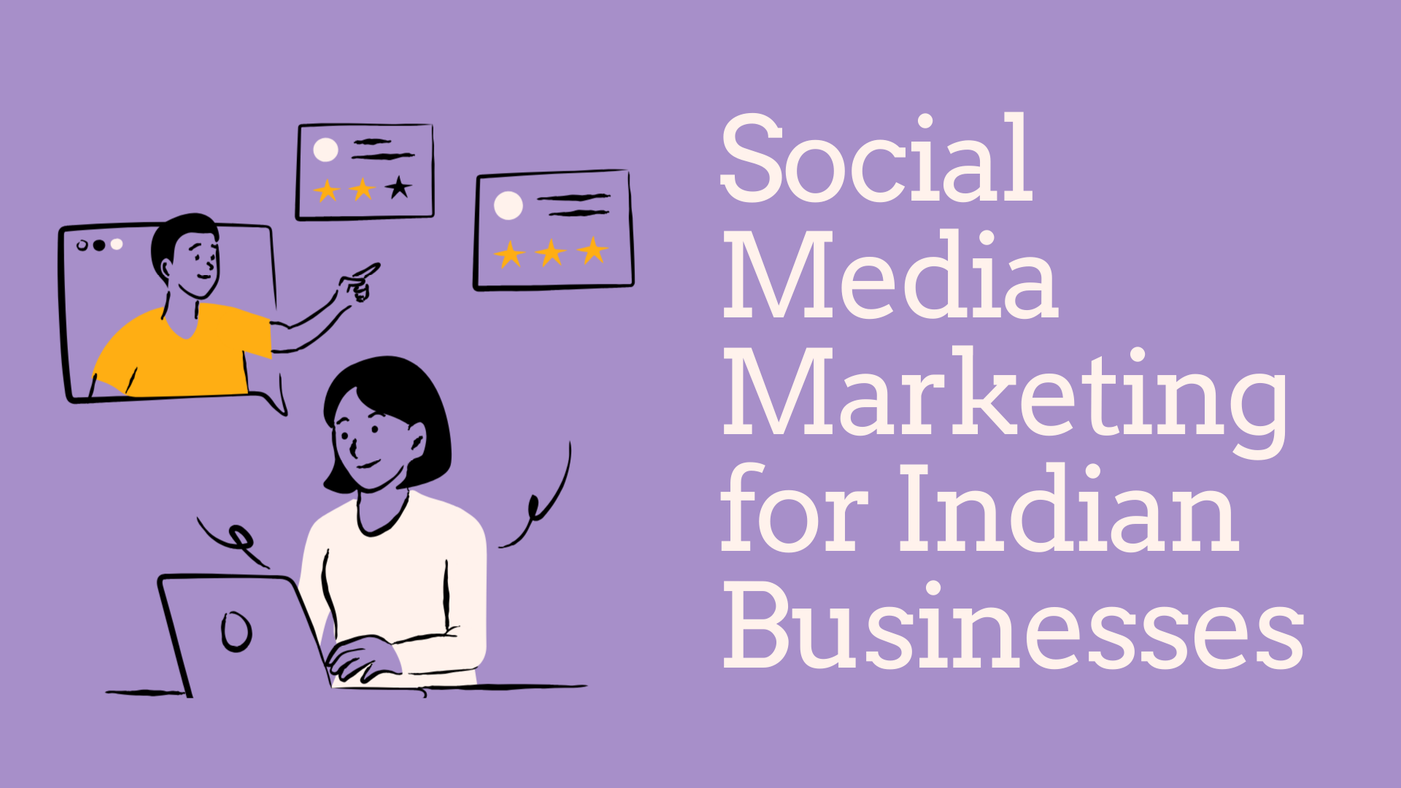In the rapidly evolving digital landscape, social media marketing has emerged as a powerful tool for businesses to connect with their audience, boost brand visibility, and drive sales. Indian businesses, especially small and medium enterprises (SMEs), have increasingly adopted social media platforms to reach their target audience. However, with intense competition and ever-changing algorithms, an effective social media strategy is essential. This guide aims to provide Indian businesses with actionable insights into leveraging social media to their advantage.
Why Social media marketing Matters
Social media has transformed the way businesses interact with their audience. In India, with over 500 million active internet users and a growing base of smartphone users, social media has become a crucial marketing channel. Platforms like Facebook, Instagram, LinkedIn, and WhatsApp are not just for social interactions but powerful tools for businesses to:
-
Build brand awareness
A strong social media presence helps businesses stand out in a crowded marketplace.
-
Engage with customers
Social media allows for real-time interaction, customer support, and feedback.
-
Increase website traffic and sales
Strategic social media campaigns drive users to business websites and convert them into customers.
For Indian businesses operating in diverse sectors—whether it’s e-commerce, fashion, food, or services—the right social media strategy can make a significant difference.
Choosing the Right Platforms in Social media marketing
Every business is unique, and so is its audience. Before jumping into social media marketing, it’s important to identify which platforms are best suited for your target market.
Facebook:
With over 300 million users in India, Facebook remains one of the most popular platforms. It offers businesses a wide array of advertising options and is especially effective for local businesses and B2C (business-to-consumer) companies
Instagram:
Known for its visually driven content, Instagram is ideal for businesses in fashion, food, travel, and lifestyle industries. Instagram’s shopping features also allow users to purchase directly from the app.
WhatsApp:
As a widely used messaging app in India, WhatsApp Business allows small businesses to connect with customers on a personal level, offering customer service, updates, and promotions.
LinkedIn:
Primarily used for B2B (business-to-business) marketing, LinkedIn is a great platform for businesses in sectors like consulting, education, IT services, and recruitment.
YouTube:
As the second-largest search engine in the world, YouTube is a powerful platform for video marketing. Businesses can create content like tutorials, product reviews, and testimonials to reach their audience.
Developing a Content Strategy in Social media marketing
Content is at the heart of any successful social media campaign. Whether it’s engaging posts, informative videos, or visually appealing images, the content you share plays a crucial role in how your audience perceives your brand.
Know Your Audience:
Before creating content, it’s essential to understand your audience’s preferences, pain points, and behavior. For example, businesses targeting young consumers might opt for short, engaging videos on platforms like Instagram or YouTube, while a B2B firm might share industry insights on LinkedIn.
Content Variety:
A mix of content types—images, videos, infographics, blogs, and user-generated content—keeps your audience engaged. User-generated content, in particular, helps build trust, as customers are more likely to believe other customers than a brand itself.
Consistency:
Regular posting is key to maintaining audience interest. Create a content calendar to plan and schedule posts, ensuring that you remain active on social media without overwhelming your audience.
Engage, Don’t Just Sell:
One common mistake businesses make is using social media purely for sales. While promoting products is important, social media is also about building relationships. Engaging with your audience through comments, polls, and direct messages helps foster loyalty and trust.
Advertising on Social Media
While organic reach is important, social media advertising can take your marketing efforts to the next level. Paid social media campaigns allow businesses to target specific demographics, locations, interests, and behaviors, ensuring your message reaches the right people.
Facebook and Instagram Ads:
These platforms offer a range of ad formats, including carousel ads, video ads, and lead generation ads. With the ability to target users based on their location, interests, and behavior, Facebook and Instagram ads are ideal for businesses looking to boost brand visibility and conversions.
LinkedIn Ads:
For B2B companies, LinkedIn ads can be highly effective in reaching decision-makers. Sponsored content, InMail, and text ads allow businesses to target professionals based on their job title, industry, and company size.
YouTube Ads:
Video ads on YouTube can be a great way to capture the attention of users. Whether it’s a skippable ad before a video or a display ad on the side, YouTube offers various formats to suit different marketing goals.
Measuring Success in Social media marketing
To ensure that your social media marketing efforts are paying off, it’s essential to track and measure the results of your campaigns.
Engagement Metrics:
Metrics such as likes, shares, comments, and followers provide insights into how your audience is interacting with your content. High engagement indicates that your content resonates with your audience, while low engagement may signal the need for adjustments.
Conversion Rates:
Social media marketing should ultimately drive sales, lead generation, or website traffic. Tracking the conversion rate from your social media ads or posts helps you measure return on investment (ROI).
Customer Feedback:
Social media is a two-way street. Pay attention to comments, reviews, and messages from your audience. This feedback can provide valuable insights into areas for improvement and help enhance your products or services.
Localizing Your Strategy for Indian Markets
One of the unique challenges Indian businesses face is the diversity of their audience. With multiple languages, cultures, and regions, it’s essential to tailor your social media strategy accordingly.
Language:
India is a multilingual country, and businesses that market in regional languages can create a more personal connection with their audience. Platforms like Facebook allow businesses to target users based on language, making it easier to reach non-English-speaking consumers.
Cultural Relevance:
Festivals, events, and local trends play a big role in shaping consumer behavior. Brands that create culturally relevant content around occasions like Diwali, Holi, or Independence Day can engage their audience on a deeper level.
Regional Targeting:
For businesses with a local focus, targeting specific regions through paid ads can be highly effective. For example, a restaurant in Mumbai might run Instagram ads targeting users within the city, while an online fashion brand might promote its products across several states.
Challenges and Best Practices
While social media marketing offers numerous benefits, Indian businesses may face challenges like:
Changing Algorithms:
Social media platforms frequently update their algorithms, which can affect the reach of your posts. Staying up-to-date with these changes and adjusting your strategy is crucial for maintaining visibility.
Competition:
With thousands of businesses competing for attention on social media, standing out requires creativity and consistency. Investing in quality content and building a strong brand identity can help you differentiate yourself.
Budget Constraints:
Small businesses often operate with limited budgets. To maximize your return on investment, start with organic strategies and scale up with paid ads as your audience grows.
Conclusion
Social media marketing is an indispensable tool for Indian businesses looking to thrive in the digital age. With the right platforms, a strong content strategy, and a focus on engagement, even small businesses can effectively reach their target audience and grow their brand. By localizing content, tracking performance, and staying adaptable to changing trends, businesses can achieve sustained success in the competitive social media landscape.
visit us : https://digitalsolutiontech.com/
visit our LinkedIn: https://www.linkedin.com/company/digitalsolutiontech/






Leave A Comment